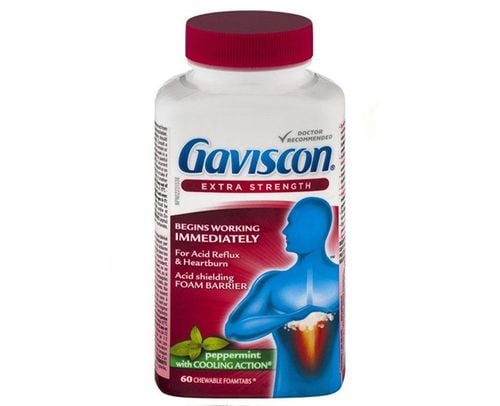This is an automatically translated article.
Meclopstad belongs to the group of gastrointestinal drugs, indicated for the treatment of nausea and vomiting. To ensure safety for your health and maximize the effectiveness of your treatment, you need to take Meclopstad exactly as directed by your doctor.
1. What is Meclopstad?
Meclopstad contains the ingredient Metoclopramide 10mg and other excipients just enough provided by the manufacturer. The drug is prepared in the form of tablets, the box includes 3 blisters, 10 blisters, each blister has 10 tablets.
Meclopstad's mechanism of action:
Metoclopramide is a dotamine receptor blocker, antagonizing central and peripheral effects, making receptors in the gastrointestinal tract sensitive to acetylcholine. Meclopstad increases intestinal motility of the antrum, duodenum, and jejunum. The drug also works to reduce the dilation of the upper stomach and increase the contractility of the antrum. The combination of these two effects rapidly empty the stomach and reduce reflux from the duodenum and stomach to the esophagus. The antiemetic effect of the drug is due to its direct anti-dopamine effect on the chemoreceptor trigger zone and the vomiting center as well as its antagonistic effect on the Serotonin receptor.
2. What are the uses of Meclopstad?
Meclopstad is indicated for treatment in the following cases:
Support for the treatment of symptoms of nausea and vomiting. Abdominal distention, indigestion due to intestinal motility disorders. On the other hand, Meclopstad is contraindicated in the following cases:
Patients who are allergic to the active ingredient Metoclopramide and other excipients contained in the drug's ingredients. In the case of patients in whom the stimulation of gastrointestinal motility is potentially dangerous, such as gastrointestinal bleeding, functional intestinal obstruction or perforation of the gastrointestinal tract. Patients with tardive dyskinesia caused by neuroleptics or by the active substance Metoclopramide. Patients with diagnosed or suspected pheochromocytoma (risk of exacerbation of hypertension). The patient has had previous rectal inflammation or bleeding.
3. Dosage and how to use Meclopstad
Meclopstad drug is prepared in the form of tablets, used orally.
Below is the recommended dose of Meclopstad drug:
Adults: Use at a dose of 1/2 - 1 tablet/time, 3 times a day, at least 6 hours apart each time. Children with weight over 20kg, use at a dose of 4mg/kg/day, divided into 4 oral doses per day. For patients with severe renal impairment: Reduce daily dose based on creatinine clearance as prescribed by the treating physician. Note: The above dosage is for reference only. The treating doctor will base on the condition of each patient to prescribe the appropriate dose, ensuring safety and effectiveness.
4. Side effects of the drug Meclopstad
Doctors always consider between the benefits that Meclopstad brings to the patient and the possible risk of side effects to prescribe the appropriate medication.
Meclopstad is generally well tolerated, side effects are usually mild and transient, which usually resolves when treatment is discontinued. Some common side effects of Meclopstad are as follows:
Extrapyramidal symptoms such as drowsiness, fatigue, dizziness, rarely headache, diarrhea, hypotension, moderate sweating. In the case of prolonged treatment with Meclopstad, there is a risk of dyskinesia for the patient. Increase blood prolactin, amenorrhea, increase lactation, breast enlargement in men. Some cases cause methemoglobinemia in neonates. In case the patient has any of the above side effects or the unusual symptoms are suspected due to the drug, please let the treating doctor know for full advice.
5. Meclopstad drug interactions
It is necessary to list the types of drugs you are taking, including prescription drugs, non-prescription drugs, functional foods, herbs, ... with your doctor for advice on appropriate medication.
Some interactions between drugs when used in combination with Meclopstad are as follows:
Levodopa: Due to the competitive antagonism between Levodopa and sedatives, there is a possibility of increasing the side effects of Meclopstad. Stimulants such as alcohol, beer: Increase the sedative effect of the drug. Antihypertensive drugs: May enhance the antihypertensive effect and cause orthostatic hypotension. Other CNS depressants such as antidepressants, antihistamines, barbiturates, anxiolytics, clonidine, hypnotics: Risk of increased CNS depression, possibly cause adverse effects, especially when driving or operating machinery.
6. Precautions when taking Meclopstad
Some notes when patients taking Meclopstad are as follows:
Undesirable effects on nerves (extrapyramidal syndrome) may occur, especially in children and young adults. In case of partial or total vomiting, the patient should still keep the interval between doses before taking the drug again. Preventing the risk of dehydration for the patient when vomiting a lot. Rehydration is usually taken orally with a "sugar-salt" solution and the patient should drink several times, a little each time. Meclopstad should not be used in patients with epilepsy (may increase the frequency and intensity of seizures). Meclopstad should be used with caution in patients with liver and kidney failure, the dose should be reduced for patients. Pay attention to vehicle and machine drivers about the possibility of falling asleep during drug administration. Only use magnesium for pregnant women unless absolutely necessary and specifically prescribed by the treating doctor. Breast-feeding is still possible with temporary medication (such as to prevent vomiting after Cesar surgery) as long as the baby is born at term and is in good health. In case the baby is born prematurely or takes high dose and long-term drugs, breast-feeding should not be done.
7. What to do in case of missed dose or overdose of Meclopstad?
When forgetting a dose, the patient should take it as soon as he remembers, the medicine can also be taken 1-2 hours apart from the usual time of taking the medicine. However, the patient should skip the missed dose if it is almost time for the next dose and do not double the dose if the patient forgets to take the dose. When an overdose of the drug Meclopstad, there is no death to the patient. Common symptoms of moderate cognitive dysfunction and extrapyramidal syndrome such as hypotension, nausea, vomiting, tachycardia. The patient should immediately stop the drug and notify the doctor. Immediately take the patient to the nearest hospital when the condition worsens. Above is information about uses, dosage and precautions when using Meclopstad. Meclopstad is a prescription drug, to be taken under the direction of a doctor. You should only use this medicine after having been diagnosed with the disease and prescribed by a qualified doctor.













